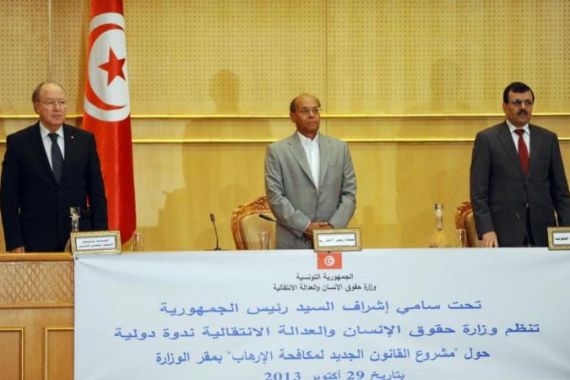Tunisia’s Black Book: transparency or witch-hunt?
The black list stirred a wide controversy, while many fear it could undermine the process of transitional justice.

Tunisian President Moncef Marzouki recently published a book titled, The Propaganda Apparatus Under Ben Ali: The Black Book. The book lists names of journalists, outlets, TV channels, news agencies, opinion makers, university professors and academics, who are alleged to have collaborated with the previous regime to improve former President Ben Ali’s public image, both nationally and internationally. Allegations in the book appear to be based only on the archives of the president. It is currently circulating on the web in its e-version.
The president has portrayed the publication of the Black Book as a means to achieve greater government transparency, and as a transitional justice tool for the upcoming truth-seeking body. Purportedly, the book aims to address media legislation and the relationship between media and the opposition. However, there are several significant problems concerning the method and process by which the book was made public that undermine many of its potential positive outcomes.
Indeed, accountability and transparency are central to the notion of democracy. They are also necessary building blocks for creating trust in state institutions and the media, which under authoritarian governments is often controlled by the state. But experience reveals that the process by which transparency and accountability issues are undertaken, is every bit as important as its outcomes. In this case, the process has not been carried out in a transparent way and opponents will inevitably see the project as a witch-hunt.
|
Truth seeking, with all of its consequences for victims and perpetrators, should be the result of comprehensive investigations, especially when concerning personal reputations. |
Archives are a valuable tool in illuminating the truth about the past, but it is not the only tool. Truth seeking, with all of its consequences for victims and perpetrators, should be the result of comprehensive investigations, especially when concerning personal reputations.
The president’s Black Book, while not the only ad hoc initiative of its kind, is, in part, the result of the slowness of the transitional justice process, which is yet to result in government measures and projects in this area within a transitional justice framework.
Transitional justice is not a special form of justice but justice adapted to societies that are transforming towards genuine democracy and civic trust after a period of pervasive human rights abuses. In some cases, these transformations happen suddenly; in others, they may take place over many decades. But it can never be selective justice or vengeful.
The process designed to achieve accountability and shed light on past abusive practices must themselves be fair and generate trust towards state institutions. A lack of clearly established procedures regulated by law and carried out in full compliance with due process achieves the opposite of what is needed; it damages trust rather than restore it.
During the national consultation on Transitional Justice, launched in April 2012, emphasis was put on achieving “the correct balance between proper planning on the one hand and keeping momentum for the desire to restore trust”. It was recognised that, “if progress is too slow, the public will lose faith. If it is rushed and not well planned, it will lead to disappointment.”
While a draft law on transitional justice was submitted to the National Constituent Assembly Speaker in January, a year later, the law has not been promulgated. Regrettably, Tunisia has so far failed to respond to victims’ and society’s rights and expectations in relation to transitional justice, leading to feelings of disappointment.
Some who have lost faith in the process might think that initiatives like the Black Book would help to fight impunity and reveal the truth. However, such ad hoc and uncoordinated efforts may undermine an overall project to achieve transparency and accountability for human rights abuses.
The best option remains the prompt passing of legislation that will allow Tunisia to build on its comprehensive planning process and provide, perhaps, one of the best contemporary examples of a transitional justice process.
Passing the transitional justice law will mark a momentous achievement and put an end to potentially arbitrary measures. The role of the quartet sponsoring the National Dialogue – Tunisian General Trade Union (UGTT), Tunisian Human Rights League (LTDH), the Tunisian Bar Association (ONAT), and Tunisian Union for Industry, Commerce and Handicrafts (UTICA) – will include placing measures for achieving transparency and accountability on the list of priorities to be discussed. This should happen in consultation with the broader civil society engaged in rekindling dialogue on transparency and accountability measures.
Choices made at this point will have a significant effect on the way Tunisia’s transition takes place. There is a strong belief that state adherence to fair and open procedures will be an advantage to Tunisia’s transition to a democratic, rights-respecting society, in both the short and long term. The proposed Black Book risks being a black mark against the principle of such an open and fair process.
David Tolbert is president of the International Center for Transitional Justice.
